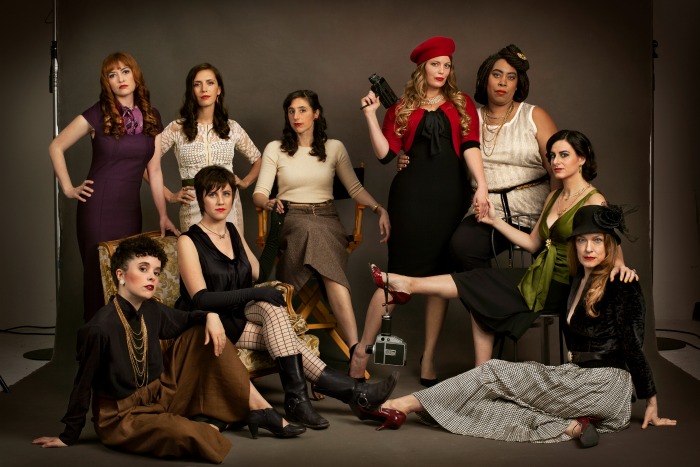
Leah Meyerhoff (seated second from left) and the Film Fatales. (Photo: Filmmaker Magazine, courtesy of Leah Meyerhoff)
This is the first of a series of interviews with filmmakers about the industry and their work.
Leah Meyerhoff is a New York-based writer and director whose work has been screened at over 200 festivals, including Cannes, the Milan International Film Festival and the Rhode Island International Film Festival. She is also a Tribeca Film Institute mentor. Her debut feature film, I Believe in Unicorns, premiered at SXSW this year.
I spoke to her about her work setting up Film Fatales, a collective for female filmmakers.
When and why was Film Fatales founded? What inspired it?
Film Fatales formed organically out of a series of conversations with several filmmaker friends. We were discussing the difficulties of getting a film made, particularly as women, and instead of sitting around complaining decided to do something about it. We started organizing monthly gatherings, hosted at the home of a different filmmaker each time, where we could get together to support each other and help each other make our films. Before we knew it, and purely through word of mouth invitations, our numbers began to grow exponentially. Now we are at the point where our guest list is overflowing, there is a monthly waiting list, and we have to form new chapters in other cities. We have tapped into a deep need for this type of community and already the outpouring of support has been overwhelming and inspirational.
How do you choose members and how does the collective benefit the filmmakers in it?
New members are invited by current members entirely through word of mouth. Full membership is open to female writer/directors who have made at least one feature film (narrative or documentary) and are willing to host or co-host a monthly gathering in NY or LA. We also regularly invite other guests and are currently figuring out how to expand without sacrificing the intimacy of the gatherings that makes Film Fatales so special.
As female filmmakers we face similar challenges and thus are in a unique position to help each other. I think in the past there was a feeling that there wasn’t room enough for all of us. Only so many films could be financed or programmed, and there were very few spots for women, and those who had “made it” may have felt the need to cling to their success. But attitudes such as those have shifted as filmmakers have realized that collaboration goes further than competition and it is not a zero-sum game. There is enough room for all of us at the table and the more female voices heard the better. By providing peer-to-peer mentorship and sharing resources with each other, we hope to promote the creation of more films made by women in a concrete and tangible way. Hopefully, by learning from other women who came before us, and helping each other make our films now, we will inspire a future generation of female filmmakers yet to come.
What’s a typical meeting like? Does the group choose the projects it’s going to discuss beforehand or is the process more informal?
The motivation behind Film Fatales is to create a community where female filmmakers can help each other and support each others’ work. The monthly meetings are kept small so that discussions can be intimate and lasting relationships formed. The host provides the discussion topic, which has ranged from the esoteric to the practical, and a moderator helps keep the meetings organized while co-hosts help with other logistics. We all sit in a circle as equals and the meetings are structured so that everyone gets a chance to speak. At the end, we break up into smaller groups and help solve each others’ immediate production needs. We support each other outside of the monthly gatherings as well. We have a writing group that meets regularly at the WGA, an online database of production resources, field trips to support each others’ theatrical premieres, and quarterly master classes in which one member of the group teaches a specific skill to the rest of us. Since the formation of the group, I have watched writing partnerships form, financing sources be shared, cast and crew referrals pan out, and members who had been languishing in development decide to stop waiting and start making their films. In our own collective and grassroots way, we are changing the landscape of independent filmmaking one meeting at a time.
Leave a Reply